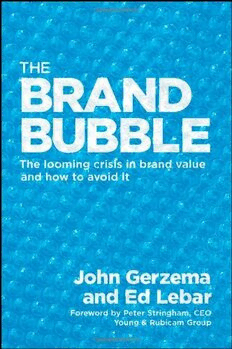
The Brand Bubble: The Looming Crisis in Brand Value and How to Avoid It PDF
266 Pages·2008·8.368 MB·English
Most books are stored in the elastic cloud where traffic is expensive. For this reason, we have a limit on daily download.
Preview The Brand Bubble: The Looming Crisis in Brand Value and How to Avoid It
Description:
The authors lay out credible evidence that businesses think brands are worth more than the consumers who buy them. At the same time, the financial markets keep raising brand valuations. The result - a brand bubble that represents $4 trillion in S&P market capitalization alone. According to the authors, the average brand value component of market capitalization is 71% using Young and Rubicon's 'BrandAsset Valuator' that was developed with $113 million to track 40,000 brands in 44 nations.
Explanations for the decline in consumer valuations of brands: 1)Glut of products - 58,375 new products introduced in 2006, over 2X that of just 2002. The average American sees 60% more ad messages/day than when President Clinton took office. Not surprisingly, over 81% of consumers could not name one of the top 50 products launched that year. 2)The glut invariable leads to commoditization of brands. 3)Consumers are more price sensitive - not surprising given the flattening of real incomes and large job losses. 4)Better products - even the lowest-priced goods exceed the average acceptable quality levels for most people. Stated alternatively, regardless of what you buy, you'll be happy with your purchase. 5)Trust in institutions and corporations has declined - this includes advertising as well.
The authors should have quit at this point. The remainder of "The Brand Bubble" is vague, and seems like a long commercial for Y&R services. Reality, however, is that a growing worldwide surplus of goods and declining economic strength for U.S. consumers doesn't leave much future for brand value. This trend is reflected in growing Wal-Mart and declining mall, high-end store sales. Period, end of book.
See more
The list of books you might like
Most books are stored in the elastic cloud where traffic is expensive. For this reason, we have a limit on daily download.
